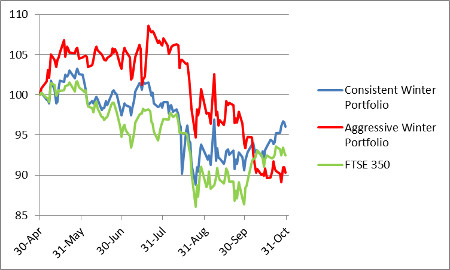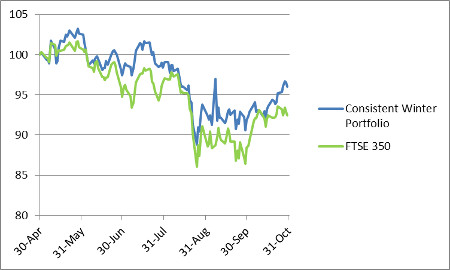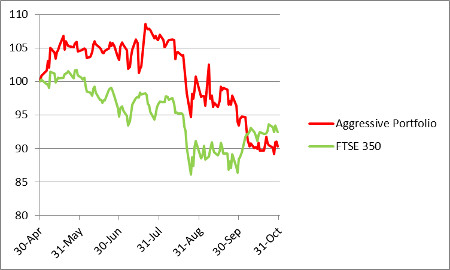Mixed summer for seasonal portfolios
6th November 2015 15:46
by Lee Wild from interactive investor
Share on
It was a typically mixed British summer in terms of the weather. Unfortunately for us, it was a real stinker for global stockmarkets. Still suffering a hangover after hitting a record high late April, three days before the launch of our summer portfolios, UK shares were hammered by a tag-team of headwinds - US interest rates and Chinese growth fears. That meant mixed fortunes for our Consistent and Aggressive seasonal strategies.
Following the huge success of our maiden winter portfolios, launched this time last year, we built consistent and aggressive summer portfolios based on identical principals. Using 10 years of data from Harriman House, publisher of The UK Stock Market Almanac, we took the five companies with the greatest number of positive returns between 1 May and 31 October to make the Consistent Winter Portfolio. Historically, it had risen on average 8.9% annually for a decade versus just 0.3% for the FTSE 350 benchmark index.
Being a bit more flexible on track record would offer potentially higher returns, but with extra risk. Still, the companies we picked for the Aggressive portfolio had all risen at least 70% of the time over the past 10 summers, making an average annual profit of 17%.
And things looked great this year, too. Half-way through the six-month strategy, the aggressive portfolio was up almost 9%. There were also modest gains for the consistent portfolio at a time when the FTSE 350 was down 2%. However, a market crash in August was indiscriminate and all our portfolios gains were wiped out.

By the end of October, our aggressive portfolio had turned from hero to zero, finishing the summer down 9.7% versus a 7.6% decline for the FTSE 350. Still, the consistent portfolio did what it's done for the past 10 years and beat the benchmark index, registering a more modest loss of 4%. And dividends make the outcome more respectable. Include income from payouts and the consistent portfolio was down just 2.4% and the aggressive basket of shares 8.7%.
Here's a look at the highs and lows of this year's summer portfolios.
Consistent Summer Portfolio
| Company | Ticker | 10-year average return (%) | 2015 return (%) |
| Dechra Pharmaceuticals | DPH | 11 | -5 |
| Diageo | DGE | 6 | 4 |
| National Grid | NG. | 4 | 5 |
| PZ Cussons | PZC | 13 | -16 |
| Shire | SHP | 10 | -8 |
Apart from one or two close shaves, the Consistent Summer Portfolio was always ahead of the benchmark index. Unfortunately, it still spent the second half of the period in the red, although include dividends and the deficit was marginal.
was the best performer over the summer, ending the season up over 5%. A new Tory government meant the power transmission network company made a great start, although concerns about valuation soon had the shares at a 14-month low. Clearly, that was buying territory and high-yielding Grid thrashed the market over the next few months.
Guinness and Smirnoff vodka giant enjoyed a bright start, too, with interest generated by talk that Brazil's richest man was about to bid. He didn't, and the shares went south with the wider market in August. Allegations that it shipped excess inventory to distributors in an attempt to artificially boost sales figures were unhelpful, but at its low the shares screamed value and they jumped more than 14% over the next two months to finish the summer up 4%.

Drug giant is knee-deep in M&A. It's got deep pockets and wants to compete with the other heavyweights all desperate to do big deals. Shire launched a hostile $30 billion all-share offer for America's Baxalta in August, but the market didn't like it much and it will cost the Irish drugmaker much more now. Thankfully, positive results for lifitegrast, its treatment for dry eye disease, right at the end of October narrowed our portfolio's losses substantially.
Pet drugs supplier did a yo-yo job, but still spent most of the six months underwater. Annual results were largely in line with expectations and momentum carried through into the first quarter. The shares are worth more than this, but it remains under the radar for most investors.
Saving the worst till last, soaps and detergents big-hitter had a real stinker. Take your pick from a bunch of headwinds - Ebola, emerging markets slowdown and Nigerian currency collapse are our favourites. PZ shares lost 16% of their value over the summer, their worst summer performance since the financial crash.
Aggressive Summer Portfolio
| Company | Ticker | 10-year average return (%) | 2015 return (%) |
| Aveva group | AVV | 16 | 21 |
| Entertainment One | ETO | 29 | -30 |
| Micro Focus International | MCRO | 15 | 0 |
| BTG | BTG | 13 | -13 |
| PZ Cussons | PZC | 13 | -16 |
Everything was going great guns at our Aggressive Summer Portfolio for more than three months. In fact, it couldn't have started any better as full-year results from met forecasts and talk did the rounds that a bid approach was brewing for the engineering design software firm. It was, and two months later French firm Schneider Electric pounced with a complicated takeover deal. Aveva held onto the bulk of its gains and ended the summer up 21%.
IT company did well, too, ending the season little changed compared with big losses for the benchmark index. It had been up as much as 14% following better-than-expected full-year results.

spectacular run of summer gains came to an equally spectacular end. Every month we reported that the pharma group divided opinion in the City as focus remained very much on Varithena. There's no doubting the potential of its varicose vein treatment, but translating interest from doctors into actual sales has been slow work. It's why chiefs said last month that full-year group revenue will be in the lower half of its guided range of £410-£440 million.
However, the real surprise in this portfolio was , the media company which owns the rights to the Peppa Pig children's cartoon franchise. Again, its shares had risen almost 17% by early July, but that was too good for Marwyn Value Investors. The activist hedge-fund, which had watched a two share price rallies unravel last year, sold a 9% stake at 330p, a big discount to the market price. A couple of months later it sold the rest to Canada Pension Plan Investment Board for 269p a share.
To round off its annus horribilis, eOne bosses then decided to raise £140 million through a heavily-discounted rights issue to buy the rest of Peppa Pig firm Astley Baker Davies.
This article is for information and discussion purposes only and does not form a recommendation to invest or otherwise. The value of an investment may fall. The investments referred to in this article may not be suitable for all investors, and if in doubt, an investor should seek advice from a qualified investment adviser.